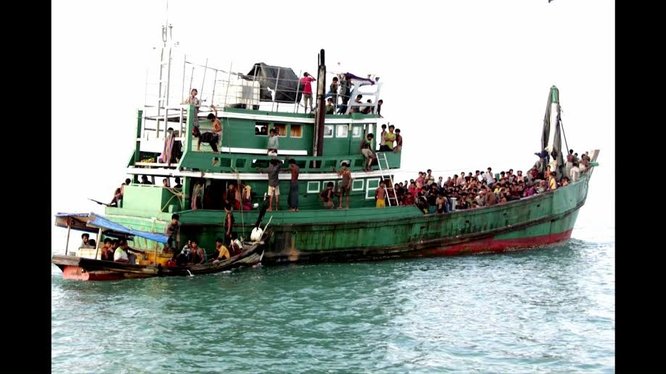As the news coverage of the migrant crisis in the Bay of Bengal and the Andaman Sea drops away, the UN has made a renewed call to harness the energy to solve the regional problem with a 12 June updated appeal.
“It is imperative to keep this issue alive in order to find comprehensive ways to resolve it once and for all,” the United Nations High Commissioner for Refugees’ (UNHCR) Vivian Tan told DVB. “Amid the recent media attention, leaders in Southeast Asia have acknowledged this as a regional problem and shown a willingness to address it in a coordinated way. This momentum must not be lost.”
After traffickers’ camps in Thailand came into the glare of the world media, and Prime Minister Prayut Chan-o-cha subsequently swore to demolish those networks, leaving the lucrative system temporarily inoperable, UNHCR says that 4,000 irregular migrants and refugees have since disembarked in the Southeast Asian region, with potentially thousands more having found their way out of camps.
But Tan says that despite the recent headlines, this exodus is not a new phenomenon.
“While these irregular boat movements were a hot topic in the news recently, they are actually the symptoms of a long-standing issue in the region. Every year tens of thousands of people from Bangladesh and Myanmar [Burma] risk their lives on smugglers’ boats in the Bay of Bengal in the hope of finding safety and stability elsewhere,” she says.
With the dawning realisation of just how bad the fallout was from the boatpeople crisis came an initial period of bullishness, and then calls from those Southeast Asian countries most affected – Malaysia, Thailand, Indonesia, and even Burma – for collective responsibility.
The UNHCR’s renewed appeal calls for sustained attention and funds to address the immediate needs of those who have come to shore, like those in Indonesia’s Aceh Province who were rescued by fishermen, or some 750 migrants who have been corralled in Arakan State while their nationalities undergo a verification process.
“In late May UNHCR, IOM [International Organization for Migration] and UNODC [UN Office on Drugs and Crime] shared with [Southeast Asian] governments a 10-point action plan to address the problem in a holistic way. We have also incorporated the key elements of this action plan into UNHCR’s appeal for US$13 million to enhance responses and seek solutions to this regional challenge,” said Tan.
Beyond humanitarianism, UNHCR is also appealing for funds to address the “root causes” of these movements.
Specifically in Burma and in Bangladesh’s border region, thousands of Muslims have been living in in camps, under heavy restrictions, since 2012 when more than 140,000 Rohingya were left homeless and 280 killed by communal violence and rioting between Muslims and Arakanese in Arakan State. These camps – containing both officially registered and unregistered refugees – have been the point of origin for many of those who end up in the hands of traffickers or smugglers in the region.
[related]
From UN Secretary General Ban Ki-moon to Assistant Secretary of State Antony Blinken, international calls for the search and rescue of boats were quickly followed by demands that the governments of the countries of origin – Burma and Bangladesh – address these “root causes”.
This language was in turn adopted by those nations, with a statement from a 29 May meeting between ASEAN and other officials eliciting a promise to address root causes – although, with no mention of the ‘R-word’, Rohingya, the use of which was barred by Burma from the meeting.
So, how do UNHCR expect that funds raised can translate into a reduction in push factors in Burma, when seemingly faced with such an abject lack of political will?
“Some of the funds UNHCR is seeking will go towards supporting source countries to create a stable environment. This includes expanding assistance to displaced people in Rakhine [Arakan] State who choose to return or relocate, to help them reintegrate in a sustainable way,” said Tan.
“It also involves engaging development actors to help build the capacity of local communities and invest in development needs. At the same time, we are ready to facilitate the sharing of experiences by countries in the region that have dealt with similar citizenship and documentation issues,” she added.
The Burmese government has faced pressure to address the continued confinement of thousands of Rohingya in camps, though plans for resettlement are frequently met with protests from Arakanese Buddhists.
“We understand from the government that some 10,000 displaced people in Rakhine [Arakan] State have been able to return or relocate in recent months. This is very encouraging as a durable solution to displacement and we hope it can be expanded to help more people pursue normal lives outside IDP camps,” said Tan.
The UNHCR representative in Bangkok also described hopes to find safer legal alternatives to the sea voyages, including freer regional movement for certain categories of workers, such as labourers, accompanied with a granting of some official status in host countries.
With such ASEAN-focused approaches, UNHCR has acknowledged that solutions for the problem of irregular and dangerous migration need to lie in long-term, collaborative planning – by those same ASEAN leaders who, in fact, called for collective responsibility when the crisis was at its height.
The UN obviously believes that when it comes to implementing a strategy, there is no time like the present.
“This momentum must not be lost,” said Tan.



